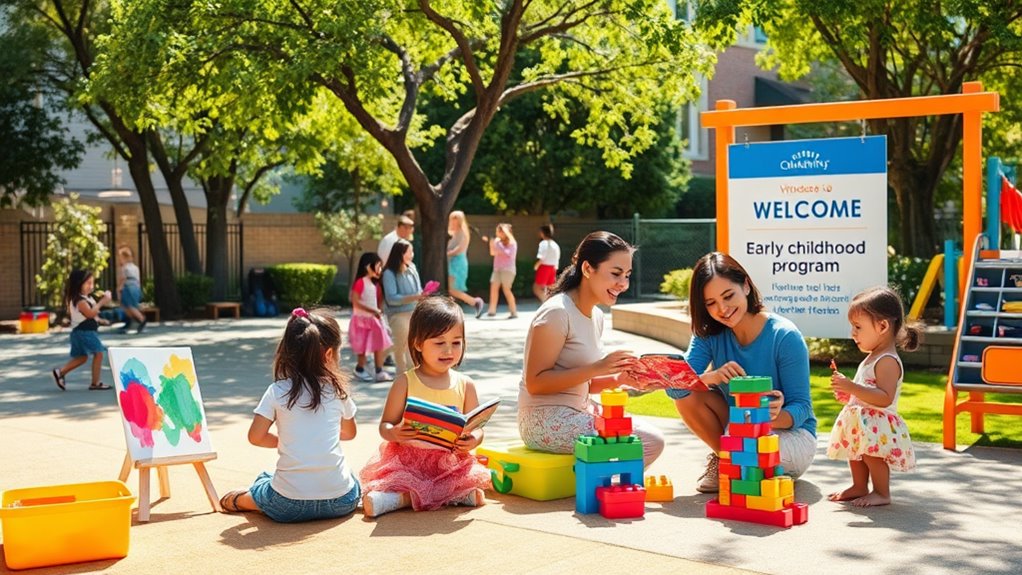Secret to Your Child’s Success- How Parent-Teacher Communication Changes Everything!
The secret to your child’s success lies in strong parent-teacher communication. When you maintain open dialogue with teachers, you’re not just sharing insights about your child; you’re creating a collaborative environment that enhances their learning experience. Regular check-ins and constructive feedback foster trust and build a partnership aimed at your child’s growth. Utilize digital tools for accessibility and effective interaction, ensuring you’re both aligned in supporting their academic journey. By reinforcing classroom learning at home, you’ll nurture their love for education. Keep exploring ways communication can strengthen this essential partnership—there’s so much more to discover!
Key Takeaways
- Open communication between parents and teachers enhances student engagement and academic success by providing critical insights on progress and improvement areas.
- Building a trusting relationship fosters collaboration and a shared commitment to the child’s educational journey, strengthening the partnership between home and school.
- Effective communication strategies, such as feedback loops and proactive outreach, keep parents informed and engaged in their child’s learning experience.
- Utilizing digital platforms like Google Classroom facilitates real-time updates and accessible communication, supporting ongoing dialogue about the child’s progress.
- Involving parents in the learning process and aligning home support with classroom expectations reinforces a child’s success and fosters a love for learning.
Importance of Communication
Communication between parents and teachers is crucial for a child’s success. When you actively engage with your child’s teachers, you create a supportive network that enhances student engagement.
Open lines of communication allow teachers to share valuable insights about your child’s progress, strengths, and areas needing improvement. This feedback is essential; it helps you understand how to support your child at home, reinforcing what they’re learning in school.
Moreover, parent feedback is equally important. When you provide your thoughts about classroom activities or curriculum changes, you’re contributing to a collaborative educational environment.
Your perspective can help teachers tailor their approaches, ensuring that the learning experience meets your child’s unique needs.
Building Trust Between Parents and Teachers
Establishing a solid foundation of trust between parents and teachers is essential for fostering a successful educational environment. When you and your child’s teacher work together, you create a space where your child feels supported and valued.
Building rapport is key to this trust. Take the time to get to know each other, whether through casual conversations during drop-off or attending school events. A friendly and open approach can go a long way.
Fostering collaboration is another crucial aspect. You both share a common goal: your child’s success. By acknowledging each other’s expertise—your insights as a parent and the teacher’s educational knowledge—you can create a stronger partnership.
Regular check-ins, whether via email or in-person meetings, can help maintain this collaboration and keep everyone on the same page.
Effective Communication Strategies
Engaging in open dialogue is crucial for maintaining a strong parent-teacher relationship. To foster this connection, you should prioritize effective communication strategies. One key approach is establishing feedback loops. By sharing insights about your child’s progress and challenges, you can help teachers understand their unique needs. In turn, teachers can provide you with valuable information about your child’s performance in the classroom.
Another important strategy is proactive outreach. Don’t wait for parent-teacher conferences or report cards to communicate. Instead, reach out regularly to discuss your child’s development, ask questions, and share any concerns. This keeps both you and the teacher informed and engaged in your child’s education.
Utilizing technology can also enhance your communication efforts. Whether it’s through emails, school portals, or messaging apps, make sure you’re comfortable using these tools to stay connected.
Lastly, listen actively during conversations. When teachers share their observations, it’s essential to take their feedback seriously and consider it in your approach at home.
Tools for Enhanced Interaction
In today’s digital age, leveraging the right tools can significantly enhance your interaction with teachers. Utilizing various digital platforms allows you to stay connected and informed about your child’s progress. Whether it’s through school websites, communication apps, or social media groups, these tools make it easier than ever to reach out and engage with educators.
Setting up regular conversations through these platforms creates effective feedback loops. You can ask questions, share concerns, and celebrate your child’s achievements. This ongoing dialogue not only strengthens your relationship with teachers but also shows your child that education is a shared priority.
Consider using platforms like Google Classroom or Class Dojo, which facilitate real-time updates on assignments and classroom activities. These tools allow you to monitor your child’s work and provide timely support when needed.
Additionally, scheduling virtual meetings or phone calls with teachers through these platforms can make communication more accessible and less intimidating.
Supporting Your Child’s Learning
Effective communication with teachers is just the starting point for supporting your child’s learning journey. Once you’ve established that connection, it’s essential to create a robust learning environment at home. This means setting aside a dedicated space where your child can focus on their homework without distractions. A well-organized area with the necessary supplies helps them get into the right mindset for studying.
Homework support is crucial, too. Being involved in your child’s assignments doesn’t mean doing the work for them; rather, it’s about guiding them through challenges and encouraging problem-solving. Ask questions that prompt them to think critically and offer assistance when they’re stuck, ensuring they learn and grow from the experience.
Additionally, keep an open dialogue about what they’re learning in school. This helps you understand their strengths and areas for improvement. By discussing their progress with their teachers, you can tailor your support at home to align with classroom expectations.
Ultimately, combining your efforts with educators creates a powerful partnership that fosters your child’s success and instills a lifelong love for learning.
Celebrating Success Together
Every milestone your child achieves, whether it’s mastering a new math concept or receiving praise for a school project, deserves to be celebrated. When you recognize these achievements, it not only boosts your child’s confidence but also strengthens the bond between home and school.
Collaborating with teachers to celebrate milestones can create a supportive environment that encourages your child to strive for more. Consider hosting a small celebration at home or sharing the good news with family and friends. This not only shows your child how much you value their efforts but also reinforces the importance of hard work.
When teachers see parents actively celebrating successes, they feel encouraged to engage further and share in the joy of these achievements.
Frequently Asked Questions
How Can I Approach a Teacher About My Child’s Struggles?
You’d think approaching a teacher about your child’s struggles is like climbing Everest! Start by asking effective questions, discussing strategies they’ve seen work. Together, you’ll uncover ways to help your child thrive like a superstar!
What if My Child’s Teacher Is Unresponsive to My Communication?
If your child’s teacher isn’t responding, try different teacher engagement strategies like scheduling a face-to-face meeting. Addressing and overcoming communication barriers can foster better dialogue, ensuring your child’s needs are met effectively.
How Often Should I Communicate With My Child’s Teacher?
It’s not just about frequency; it’s about quality. You should aim for weekly updates through various communication channels, like email or meetings, to stay informed and engaged in your child’s learning and progress.
What Information Should I Share With the Teacher About My Child?
You should share your child’s learning style and any behavioral traits. This helps the teacher tailor their approach to better support your child’s needs, ensuring a more effective and engaging learning environment for them.
Can Parent-Teacher Communication Improve My Child’s Academic Performance?
Absolutely, parent-teacher communication can significantly enhance your child’s academic performance. By sharing insights and employing effective communication strategies, you can provide essential academic support, ensuring teachers understand your child’s needs and strengths for better learning outcomes.





